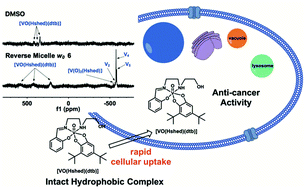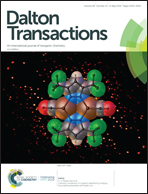Hydrophobicity may enhance membrane affinity and anti-cancer effects of Schiff base vanadium(v) catecholate complexes†‡
Abstract
Anti-cancer activities of vanadium compounds have generated recent interest because of a combination of desirable properties for chemotherapy, i.e., strong cytotoxicities, anti-metastatic activities and relatively low systemic toxicities. Certain hydrophobic vanadium(V) Schiff base/catecholate compounds, which as shown herein, have increased stability in aqueous media and affinity for membrane interfaces. Depending on their hydrophobicity, they may be able to enter cells intact. In this manuscript, two hydrophobic V(V) catecholate substituted analogues, [VO(Hshed)(cat)] and [VO(Hshed)(dtb)], (Hshed = N-(salicylideneaminato)-N′-(2-hydroxyethyl)-1,2-ethanediamine, cat = pyrocatechol, and dtb = 3,5-di(tert-butyl)catechol and the vanadium(V) precursor [V(O)2(Hshed)]) were synthesized for their ability to interact with membranes and their anti-cancer effects. Using 51V and 1H NMR spectroscopy, the presence and location of the free ligand, H2shed, and the three V(V) complexes were examined in a model membrane microemulsion system. The stability of the three complexes was measured in aqueous solution, cell media and an inhomogeneous microemulsion system. Our results demonstrated that free ligand H2shed and the intact V(V) complexes associated with the interface but that the V-complexes hydrolyzed to some extent because oxovanadates were observed by 51V NMR spectroscopy and decreasing complex by absorption spectroscopy in cell media. When determining the effects of V(V) catecholate complexes on bone cancer cells, the strongest effects were observed with the more stable hydrophobic complex [VO(Hshed)(dtb)] that was able to best associate and penetrate the model membrane system intact. These studies are consistent with the membrane permeability studies being a good predictor for in vitro cytotoxicity assays because [VO(Hshed)(dtb)] can pass through the cellular membrane intact, which may enhance its anti-cancer activities.

- This article is part of the themed collection: Nitrogen Ligands


 Please wait while we load your content...
Please wait while we load your content...